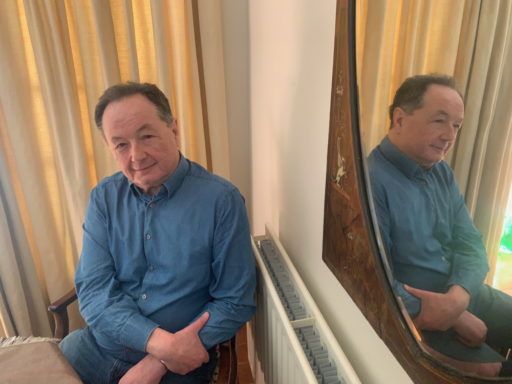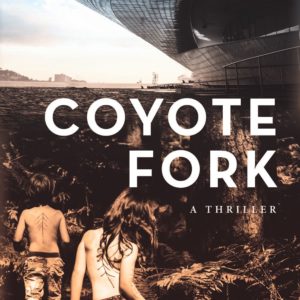We recently spoke with author James Wilson about his new Slant book, Coyote Fork: A Thriller.
This is your first foray into the world of crime fiction—why did you decide this was the right form for the story you wanted to tell?
Most of my novels center on a quest of some kind, though there’s not always a criminal element. With Coyote Fork I tried a number of different approaches—including science fiction—before finally settling on this form. In part, my decision was dictated by the themes of the book, the characters I wanted to introduce, and the setting (predominantly California). But my love of classic U.S. crime fiction—Raymond Chandler, Ross McDonald, James Lee Burke, Elmore Leonard—also played an important role.
Can you say something about the mix of characters in the book? They range from a billionaire tech tycoon to a beleaguered college professor, from a marginalized Native American community to the kind of people Hillary Clinton described as “deplorables.” Why such a large canvas?
I don’t want to give too much away by spelling out just how those different groups are connected. But I think people often imagine that the impact of Silicon Valley—and particularly of social media—has been primarily on the young and the highly-educated, and I was keen to explore how it has forced its way into pretty much every corner of our collective lives.
One contrast stands out in the novel: between the world of hippie communes on the one hand, and the realm of the high-tech, social media, internet-dominated world of Silicon Valley. Are you suggesting that there are some deep cultural connections between these seemingly disparate worlds?
A good question. The Silicon Valley revolution has hit us so quickly, and transformed the way we view the world so powerfully, that it’s come to seem almost an immutable fact of life, a bit like electricity or the force of gravity.
But—as Franklin Foer shows in his excellent book World Without Mind—it is an entirely human creation, the improbable lovechild of two radically contradictory visions. On the one side is the heroic individualism of the arch-libertarian writer Ayn Rand (her novels Atlas Shrugged and The Fountainhead regularly feature on the favorite-books lists of many Silicon Valley titans, including Steve Jobs, Elon Musk, and Peter Thiel). On the other is the hippie movement of the sixties and seventies, whose anarchistic, anti-authority ethos fueled the rapid spread of the personal computer. (By democratizing access to information, so the argument went, you undermine the elite’s ability to hide the truth.)
And—for all that a company like Google is now one of the most successful capitalist enterprises in the history of the planet—it still retains traces of its counter-cultural origins: e.g., its “laid-back” attitude towards privacy and copyright, its belief in the power of the collective mind, its view of itself (still!) as a visionary David fighting against the corruption and self-interest of the establishment Goliath. This strange genesis—as well, of course, as the extraordinary technology it has given rise to—makes the tech giants exceptionally difficult to categorize, and to assimilate to any of our pre-existing structures.
You mentioned a small Native American community that plays a role in the novel. You have also written an important work on Native American history. There is a sense in the book that we not only need to remain concerned about the legacy of injustice to Native Americans but also to learn from what these peoples can teach us about how to live. Can you say something about that?
Few populations anywhere in the world can have been the subject of so many reckless generalizations—the bulk of them self-serving and profoundly ill-informed—as Native Americans. I am therefore conscious of the need to answer this question very carefully. But I think it is true to say that, for all their immense differences, most native groups derive (or derived) much of their sense of identity from their relationship with a specific landscape—that mountain, this spring—for which they are spiritually responsible. That feels to me very different from the globalized, utilitarian concern for “the environment” that is so prevalent in non-native society. And I do believe that the rest of us can learn something from it, if only because its richness and fullness and intricacy answer a deep human hunger for meaning and beauty that our flat materialism can’t satisfy.
Do you read a lot of other fiction when you are deep into the writing process, or do you prefer to keep your reading and writing identities separate?
I know that many novelists can’t read fiction by other authors when they’re writing. But me-as-writer (nit-picky and anxious about every word) and me-as-reader (childishly happy to abandon myself to a story) are so separate that—provided the themes are not too close to mine—I actually find it relaxing to lose myself in someone else’s imaginative world. And, of course, it’s only by constant reading that one starts to glimpse the astonishing range of what fiction can do.
You are a British author, but you have an obvious resonance with America as an imaginative landscape—where did this come from in your own life, and how do you think your take on America differs from an American author?
The United States has always played a crucial part in my life. My wife is American; for fifteen years I was Director of Studies for a program for U.S. undergraduates in London; and I have visited, filmed in, and written about indigenous American communities from New England to California.
It’s hard, too, to overstate what an important influence American writing was on a Brit of my generation. To begin with, there was (as I mention above) U.S. crime fiction, which seemed so much more vital than the well-upholstered world of Agatha Christie and Dorothy L. Sayers. Then there were novelists and short-story writers such as John Updike, Flannery O’Connor, John Barth, Thomas Pynchon, and Vladimir Nabokov (if he counts as American), who all seemed to be exploring ideas and playing with language in a way that had no real equivalent among their British contemporaries. More recently, Lorrie Moore, George Saunders, Ron Hansen, Jennifer Egan, Louise Erdrich, and others have continued to delight me, and to fuel my imagination with a particularly American view of the world.
If you could spend an afternoon with any other writer (dead or alive), who would that be?
The answer to that changes from day to day. At this precise moment, it would be Robert Louis Stevenson, whose adventurous spirit, and ability to keep polar opposites in a kind of dramatic tension, had a profound influence not only on Coyote Fork but on all my books.
How much of the plot was mapped out before you started writing the individual sections of the book? Do you prefer pre-planning at the macro level, or letting the writing tell you where it wants to go?
In embarking on any book, there is always a dilemma: if the story is over-plotted, the writing tends to come out desiccated and lifeless; if it’s under-plotted, then the result can appear flabby and aimless. Eventually—rather like a cook, who can tell when something is done simply by the consistency—you learn to recognize when you have enough of an outline, but not too much. For me, the two absolutely essential prerequisites before I start writing are: (a) a narrative voice that I know can carry me through the whole imaginative landscape of the book; and (b) a clear sense of what the ending will be.


